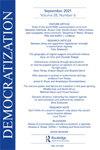Who tolerates democratic backsliding? A mosaic approach to voters’ responses to authoritarian leadership in Hungary
IF 2.9
1区 社会学
Q1 POLITICAL SCIENCE
引用次数: 0
Abstract
ABSTRACT In contexts of democratic backsliding, citizens represent the last bulwark against the systematic dismantling of checks and balances by overbearing executives. And yet, they repeatedly fail to punish authoritarian-leaning leaders at the ballot box, allowing them to consolidate their grip on power. Why is that so? We leverage a conjoint survey experiment in Hungary to probe competing mechanisms of citizen tolerance towards democratic violations in a context of severe backsliding. Our main contribution consists of demonstrating empirically the presence of a composite effect, whereby authoritarian-leaning elites succeed in offering targeted compensations to different groups, ultimately building a mosaic of support among voters to secure enduring electoral backing. We pinpoint trade-offs notably related to cultural conservatism and economic benefits among different subgroups of the population. At the same time, our empirical findings indicate surprisingly high levels of condemnation of undemocratic positions by Hungarian respondents. We discuss how this unexpected pattern points to the limitations of conjoint designs as well as the overlooked supply side of democratic backsliding. Our study feeds into broader debates about the unfolding and entrenchment of democratic backsliding and how we study these processes.谁能容忍民主倒退?匈牙利选民对独裁领导的反应的马赛克方法
摘要在民主倒退的背景下,公民代表着抵御专横高管系统性破坏制衡的最后堡垒。然而,他们一再未能在投票箱中惩罚倾向独裁的领导人,使他们得以巩固对权力的控制。为什么会这样?我们利用匈牙利的一项联合调查实验,调查在严重倒退的背景下,公民对民主侵犯行为的宽容机制。我们的主要贡献包括从经验上证明了一种复合效应的存在,即倾向独裁的精英成功地向不同群体提供了有针对性的补偿,最终在选民中建立了一个支持的马赛克,以确保持久的选举支持。我们指出了不同人群中与文化保守主义和经济利益显著相关的权衡。与此同时,我们的实证研究结果表明,匈牙利受访者对不民主立场的谴责程度高得惊人。我们讨论了这种意想不到的模式如何指向联合设计的局限性,以及民主倒退中被忽视的供给侧。我们的研究引发了关于民主倒退的展开和巩固以及我们如何研究这些过程的更广泛辩论。
本文章由计算机程序翻译,如有差异,请以英文原文为准。
求助全文
约1分钟内获得全文
求助全文
来源期刊

Democratization
POLITICAL SCIENCE-
CiteScore
6.40
自引率
12.50%
发文量
73
期刊介绍:
Democratization aims to promote a better understanding of democratization - defined as the way democratic norms, institutions and practices evolve and are disseminated both within and across national and cultural boundaries. While the focus is on democratization viewed as a process, the journal also builds on the enduring interest in democracy itself and its analysis. The emphasis is contemporary and the approach comparative, with the publication of scholarly contributions about those areas where democratization is currently attracting considerable attention world-wide.
 求助内容:
求助内容: 应助结果提醒方式:
应助结果提醒方式:


